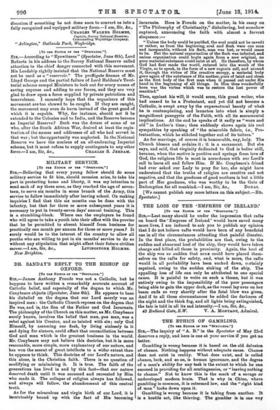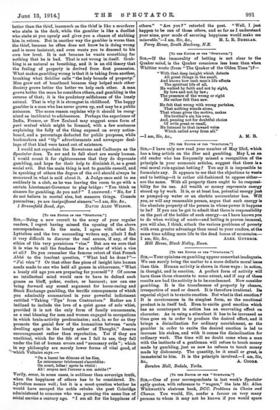THE ETHICS OF GAMBLING.
[To rsa EDISOZ 07 MP .877C7A207.".1
SIR,—The inquiry of "A. B." in the Spectator of May 23rd deserves a reply, and here is one at your service if you get no better.
Gambling is wrong because it is based on the old delusion of chance. Nothing happens without adequate cause. Chance does not exist in reality. What does exist, and is called chance, luck, and so on, is human ignorance, and the degree of a man's ability for any task is the extent to which be can succeed in providing for all contingencies, or "leaving nothing to chance." Not to know this is the mark of a savage or undeveloped modern brain. That is why in China, where gambling is common, it is esteemed low, and the "right kind of man" looks down upon it.
Gambling is wrong because it is taking from another. It is a hostile act, like thieving. The gambler is in one way better than the thief, inasmuch as the thief is like a murderer who stabs in the dark, while the gambler is like a duellist who stabs at you openly and gives you a chance of stabbing him in return. But in another way the gambler is worse than the thief, because he often does not know he is doing wrong and is more insistent, and even wants you to descend to his own low level. It is not because he wants something for nothing that he is bad. That is not wrong in itself. Grab- bing is as natural as breathing, and it is an old theory that the feeling of property is derived from first possession. What makes gambling wrong is that it is taking from another, breaking what Schiller calls "the holy bounds of property?' Men grew out of beasthood because they helped each other Society grows better the better we help each other. A man grows better the more he considers others, and gambling is the reverse of that; it is the predatory selfishness of the lonely animaL That is why it is strongest in childhood. The happy gambler is a man who has never grown up, and may be a publics nuisance. The same reason explains why it should be recog- nized as incidental to adolescence. Perhaps the experience of India, France, or New Zealand may suggest some form of pan i mutuel which might be licensed, with a few sentences explaining the folly of the thing exposed on every notice. board, and a percentage deducted for public purposes, while bookmakers and "tip" advertisements and newspaper deal- ings of that kind were taxed out of existence.
I would not reprobate the Rowntrees and Cadburys as the Spectator does. To err and to fall short are surely human. I would count it for righteousness that they do deprecate gambling, and hope for their help to diminish it, as a great social eviL But the main thing is not to gamble oneself, and in speaking of others the degree of the evil should always be measured in what is said about it. A Judge once said to me suddenly in a club, as he was leaving the room to go with a certain Lieutenant-Governor to play bridge; "You think us sinners for gambling, do you not ? " I answered "No, for I do not believe in mortal sins, but measure things. Console yourselves; ye are insignificant sinners."—I am, Sir, &c.,











































 Previous page
Previous page